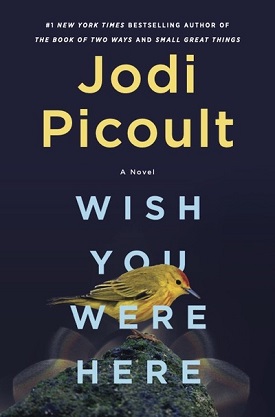 Synopsis:
Synopsis:
Diana O’Toole’s life is on track. She will be married by the time she’s thirty, done having kids by thirty-five, and move out to the New York City suburbs, all while climbing the professional ladder in the cutthroat art auction world. She’s an associate specialist at Sotheby’s now, but her boss has hinted at a promotion if she can close an important deal with a high-profile client. She’s not engaged yet, but she’s confident that her boyfriend, Finn, a surgical resident, is going to propose on the romantic vacation to the Galapagos for which they’ve been planning and saving their money . . . just days before her thirtieth birthday. Right on time.
But a virus that seemed worlds away has appeared in New York City on the eve of their departure. Finn breaks bad news to Diana. Everyone is needed at the hospital and he cannot go on vacation. But he tells her that she should still go, assuring her that it would be a shame to lose their hard-earned nonrefundable funds. So she reluctantly goes alone.
Almost immediately, Diana’s dream vacation goes awry. Her luggage is lost, the wi-fi on the island is nearly nonexistent, and the hotel they booked is closed due to the pandemic. In fact, the whole island is under quarantine and she is stranded until the borders reopen in an estimated two weeks.
Completely isolated, Diana has no choice but to venture beyond her comfort zone. Slowly, she connects with a local family when a teenager with a dark secret opens up to her, despite her father’s suspicions about tourists.
In the Galapagos Islands, where Darwin’s theory of natural selection was formed, Diana finds herself examining her relationships, her choices, and herself . . . and wondering if when she goes home, she too will have evolved into someone completely different.
Review:
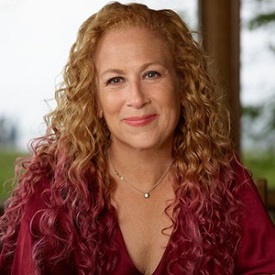
Jodi Picoult is the bestselling author of twenty-eight prior novels, including The Book of Two Ways, A Spark of Light, Change of Heart, Lone Wolf, Keeping Faith, and Nineteen Minutes. She has also penned two young adult novels with her daughter, Samantha Van Leer, which were adapted into a musical entitled Between the Lines. Four of her novels have been adapted into television movies and Her Sister’s Keeper was developed into a film. Small Great Things will be a motion picture starring Viola Davis and Julia Roberts. A graduate of Princeton University, Picoult has won numerous awards.
Picoult suffers from asthma and shares that when the COVID-19 pandemic hit, she was understandably petrified at the prospect of contracting the virus. Her fear rendered her unable to write or even read as she quarantined at her New Hampshire home for fifteen months. She relates that she had a “real sense of being un-seen and not knowing who I was or what I did anymore.” When she finally found herself able to resume work, she pondered, “How are we going to chronicle this pandemic? How do we tell the tale of how the world shut down, and why, and what we learned?” By November 2020, she knew she wanted to make sense of all that transpired during a lost year. Wish You Were Here is her answer to those questions. She describes it as a story about “best-laid plans that go awry, survival and the resilience of the human spirit, love and loss, and how one experience can change the way you think about and live the rest of your life.”
After Picoult was able to resume reading — romance novels provided the route because of their happy endings — and eventually began writing again, she happened upon an article about a Japanese man who became stranded in Machu Pichu as a result of travel restrictions. So he transformed from a tourist to a resident. Having visited the Galapagos, she wondered if, by chance, any tourists had been stranded there. She discovered that Ian Melvin, a Scottish tourist, was trapped on Isabela Island for months and was able to not only contact him, but also some of the island’s residents. She wanted to explore the concept of isolation, and how it can be “devastating . . . but can also be the agent of change.” She decided to craft a story about what it “felt like to be stuck in paradise while the rest of the world was going to hell.”
I have always believed we are the architects of our own fates. I have never really subscribed to the mantra that things happen for a reason. Until, maybe, now. ~~ Diana in Wish You Were Here
Of course, in relationship to a worldwide pandemic, survival and resilience also figured prominently into her research, and she interviewed medical professionals on the frontlines of the fight against COVID-19. She also reached out to patients who successfully fought the deadly disease, specifically people who survived being on ventilators. They described experiencing dream states that were realistic and detailed. Most of their dreams fell into one of four categories: the inclusion of a basement; being restrained or kidnapped; the appearance of a deceased loved one; or the death of a loved one. When asked to explain how the experience changed their lives, many reported that they still return to their dream-state and it can feel as vivid and real as a parallel existence. Picoult reports that many brought her full circle to the concept of isolation, and her findings figure prominently in the story . . . and its overarching themes. “When you find yourself utterly alone on a rocky outcropping or on a ventilator — the only place to find strength is in yourself. As one woman told me, ‘I’m not looking for anything outside of me anymore. I’m like, this is it I’ve got everything I need.'” Picoult believes that a uniform, universal reaction to the pandemic — whether or not one actually contracted COVID-19 — is having “a much clearer sense of what matters. . . . It’s having no expectations but taking nothing for granted. . . . It’s realizing that we could wake up tomorrow and the world could shut down. It’s knowing that at the very end of life, no matter what your net worth is and the length of your CV, the only thing you want is someone beside you, holding your hand.”
It is best to read Wish You Were Here with little advance knowledge of the plot and no expectations. Picoult has penned a thoroughly engaging story featuring intriguing and empathetic characters. At the center of the tale is Diana, an ambitious, twenty-nine-year-old New Yorker. She was never close to her mother, a photojournalist who was rarely at home while she was growing up and now suffers from dementia. Her father died tragically four years ago. Diana, an associate specialist at Sotheby’s, has very specific career trajectory goals and unexpectedly builds a rapport with a prospective client, Kitomi Ito, whose life story closely parallels Yoko Ono’s. Widowed many years earlier when her husband, a British musician, was murdered on the steps of the tony apartment building on Manhattan’s Upper West Side (where the historic Dakota is situated) in which they resided, Ito is now ready to auction off a Henri de Toulouse-Lautrec painting. Diana and her difficult boss, Eve, are determined to convince her to retain Sotheby’s to handle the sale.
But it’s March 13, 2020, the world is gradually shutting down as the COVID-19 outbreak spreads . . . and Ito decides to delay parting with the painting due to her concerns about the virus.
Diana and her boyfriend, Finn, have saved their money, budgeted, and booked a dream vacation to the Galapagos Islands. But with COVID-19 quickly ravaging New York City, Finn, a surgical resident, is pressed into service, along with all other staff. Suddenly, instead of operating on patients, he finds himself trying to save those who have contracted the deadly virus and taking a vacation is out of the question. But he urges Diana to go without him so that they don’t lose the money they have expended. Somewhat reluctantly, she departs and boards the ferry that will carry her almost to Isabela Island. As she nears the water taxi that will take her on the last leg of the journey, she notices the crowd of people waiting and is informed they are all trying to get back to Santa Cruz Island because the island is locking down for two weeks. She is offered the chance to return to Santa Cruz on the last departing ferry, but opts to proceed. As the water taxi leaves, Diana observes in the first-person narrative Picoult employs, “Suddenly it hits me: in an effort to seem more chill than I actually am, I have just stranded myself on an island.” She is indeed isolated and alone — the hotel and most businesses on the island are also closing, leaving her with no lodging or food. Fortunately, an old woman sees her and takes her in, permitting her to stay in a small apartment behind her house.
Diana reminds herself, “You are on an adventure,” and works at embracing her situation. Picoult details her exploration of the beautiful island and the relationships she develops with her rescuer, Abuela, as well as Abuela’s grandson, Gabriel, a former tour operator, and Beatriz, his troubled and sullen teenage daughter. Beatriz has returned to the island from school to ride out the pandemic. Beatriz gradually takes Diana into her confidence, and promises to mail the postcards that Diana writes to Finn each day. She tells him, “Remember how we thought it would be so romantic to be shut away from the outside world? It doesn’t feel that way when I’m alone on the outside, banging to be let back in. It makes for some pretty weird self-reflection. It’s like I am in some parallel universe where I am aware of other things gong on, but I can’t respond or comment or even be affected by them.”
When she can manage to pick up a wi-fi signal, Diana reads the emails Finn sends regularly describing, in heartbreaking and realistic detail, what he is experiencing as a physician on the front lines and the horror that is unfolding back home in New York City. He writes to Diana, “This virus is like a storm that just won’t ease up You know on some rational level that it can’t stay like this forever. Except, it does. And gets worse.” He expresses his thankfulness that Diana is away, safe from the virus that is straining medical resources and claiming lives, as well as his frustrations and sense of helplessness as, completely exhausted, he and his fellow medical professionals continue caring for the unyielding barrage of patients. Picoult says a character in healthcare was essential to the story. “And I wanted him to be working in the city, in the hospital, and I wanted this to be a love letter to New York, because, although I don’t live there, I have many friends who do, and I remember how haunted they were by the fact that the sirens never stopped. And all those tiny little details about how the city unraveled. That, to me, was important to chronicle.”
Diana feels some guilt for having taken the trip without Finn, especially when he shares how hard it is to be alone after staggeringly challenging stints at the hospital. She asks herself, “What was I trying to prove? Why didn’t I turn around and get on that ferry and go back to the airport? What kind of partner was I then, if Finn wasn’t in the forefront of my mind, when I stood on the brink between staying and leaving?”
The two-week lockdown stretches into months, and Diana’s feelings for her newfound friends deepen, causing her to question the decisions she made leading up to her sojourn to the island. Is she fully committed to Finn when “there are times he is not in the forefront of my mind? When he’s slogging through hell and I’m in a different hemisphere?”
I don’t think of it as a novel about Covid, I think of it as a novel about surviving, which is a little different. Yes, you’ll see the medical profession and you’ll see deaths in it. But to me, this is a novel about how we came through to the other side. ~~ Author Jodi Picoult
Picoult delivers a clever, shocking twist that suddenly lands Diana back in New York City and her old life. But she is unable to acclimate and adapt to being home. Diana is at first confused, wondering whether she is the one who changed or if the people around her, including Finn, have. She gradually comes to realize that her vivid and detailed recollections of all that she experienced and felt while in the Galapagos have irrevocably and fundamentally changed her. “He wants to gently set me down exactly where I was before this happened, like he’s been holding that place for me in a board game, and we are going to pick up where we left off. The problem is that I’m not the same player.” Her memories compel her to reevaluate every aspect of her life: the goals she set for herself before the pandemic, as well as her self-imposed timeline within which to achieve them. Suddenly the competitive world of art auctions doesn’t have the allure it once did and she reconsiders her fractious relationship with her mother.
When it comes to tackling thorny questions about life and individual choices, Picoult has no literary equal. She employs her signature style to construct a deeply moving exploration of Diana’s experiences and inspire readers to assess the way the pandemic has touched their own lives, as Picoult acknowledges she did. Each of her characters is fully developed and multi-layered, and there is no villain in her story . . . except, of course, the persistent, mutating virus. Rather, Wish You Were Here features characters who do the best they can, considering the circumstances they — and the rest of the world — were thrust into in 2020. Diana and Finn confront their fears in their own unique ways and, although no one emerges unscathed, Picoult affirms through their stories that the worst of times often bring out the best in each of us.
Ultimately, Diana learns that “you can’t plan your life. Because then you have a plan. Not a life.” If COVID-19 taught us nothing else, it proved that point conclusively. From Picoult’s perspective, “the world pressed pause. When we stopped moving, we noticed that the ways we have chosen to validate ourselves are lists of items or experiences we need to have, goals that are monetary or mercenary.” She hopes that surviving the pandemic has taught us all, just like Diana in Wish You Were Here, “to take the wins in a much smaller way.” And that the book serves as a guide for “reflection and of connection to one another,” helping her readers to, as she has, consider how the experience of living through the pandemic has changed the way they view the rest of their lives and enabling them to focus on what is most important to them.
Excerpt from Wish You Were Here
March 13, 2020
~~~~~~~~~~~~~~
When Finn comes home from the hospital, I am in bed under the covers wearing my favorite flannel shirt and sweatpants, with my laptop balanced on my legs. Today has just flattened me. Finn sits down beside me, leaning against the headboard. His golden hair is wet, which means he’s showered before coming home from New York–Presbyterian, where he is a resident in the surgery department, but he ’s wearing scrubs that show off the curves of his biceps and the constellation of freckles on his arms. He glances at the screen, and then at the empty pint of ice cream nestled beside me. “Wow,” he says. “Out of Africa . . . and butter pecan? That’s, like, the big guns.”
I lean my head on his shoulder. “I had the shittiest day.” “No, I did,” Finn replies.
“I lost a painting,” I tell him.
“I lost a patient.”
I groan. “You win. You always win. No one ever dies of an art emergency.”
“No, I mean I lost a patient. Elderly woman with LBD wandered off before I could get her in for gallbladder surgery.”
“Little black dress?”
A smile tugs at Finn’s mouth. “Lewy body dementia.”
This makes me think, naturally, of my mother.
“Did you find her?”
“Security did,” Finn says. “She was on the labor and delivery floor.”
I wonder what it was that made her go there — some internal GPS error, or the kite-tail of a memory so far in the clouds you can barely see it.
“Then I do win,” I say, and I give him an abbreviated version of my meeting with Kotomi Ito.
“Okay,” Finn says, “in the grand scheme of things, this isn’t a disaster. You can still get promoted to specialist, when she eventually decides to sell.”
What I love most about Finn (well, all right, one of the things I love most about Finn) is that he understands that I have a detailed design for my future. He does, too, for his own. Most important, mine and his overlap: successful careers, then two kids, then a restored farmhouse upstate. An Audi TT. A purebred English springer spaniel, but also a rescued mutt. A period where we live abroad for six months. A bank account with enough padding that we don’t have to worry if we need to get snow tires or pay for a new roof. A position on a board at a homeless shelter or a hospital or cancer charity, that in some way makes the world a better place. An accomplishment that makes someone remember my name.
(I had thought that Kotomi Ito’s auction might do that.)
If marriage is a yoke meant to keep two people moving in tandem, then my parents were oxen who each pulled in a different direction, and I was caught squarely in the middle. I never understood how you could march down an aisle with someone and not realize that you want totally different futures. My father dreamed of a family; to him art was a means of providing for me. My mother dreamed of art; to her a family was a distraction. I am all for love. But there is no passion so consuming that it can bridge a gap like that.
Life happens when you least expect it, but that doesn’t mean you can’t have a blueprint in your back pocket. To that end, while a good number of our friends are still racking up expensive degrees or swiping left or figuring out what sparks joy, Finn and I have plans. But we don’t only have the same general timeline for our lives, we also have the same dreams, as if we ’re dipping into the same bucket list: Run a marathon. Know how to tell a good cabernet from a bad one. Watch every film in the IMDb top 250. Volunteer at the Iditarod. Hike part of the Appalachian Trail. See tulip fields in the Netherlands. Learn how to surf. See the northern lights. Retire by age fifty. Visit every UNESCO World Heritage Site.
We’re starting with the Galápagos. It’s a hellishly expensive trip for two millennials in New York; the cost of the flights alone is exorbitant. But we’ve been saving up for four years, and thanks to a deal I found online, we managed to fit a trip into our budget—one that has us based on a single island, rather than the more expensive island-hopping cruises.
And somewhere on a lava-sand beach, Finn will drop to one knee and I will fall into the ocean of his eyes and say yes, let’s start the rest of our lives.
Although I have a schedule for my life that I have not deviated from, I’m treading water, waiting for the next milestone. I have a job, but not a promotion. I have a boyfriend, but not a family. It’s like when Finn is playing one of his videogames and he can’t quite level up. I’ve visualized, I’ve manifested, I’ve tried to speak it into the universe. Finn is right. I will not let a little hiccup like Kotomi’s uncertainty derail me.
Derail us.
Finn kisses the top of my head. “I’m sorry you lost your painting.”
“I’m sorry you lost your patient.”
He has been idly tangling his fingers with mine. “She was coughing,” he murmurs.
“I thought she was there for her gallbladder.”
“She was. But she was coughing. Everyone could hear it. And I . . .” He looks up at me, ashamed. “I was scared.”
I squeeze Finn’s hand. “You thought she had Covid?”
“Yeah.” He shakes his head. “So instead of going into her room, I checked on two other patients first. And I guess she got sick of waiting . . . and walked off.” He grimaces. “She has a smoker’s cough, and a gallbladder that needs to be removed, and instead of thinking of her health I was thinking of mine.”
“You can’t blame yourself for that.”
“Can’t I? I took an oath. It’s like being a fireman and saying it’s too hot to go into a burning building.”
“I thought there were only nineteen cases in the city.”
“Today,” Finn stresses. “But my attending put the fear of God into us, saying that the emergency department will be swamped by Monday. I spent an hour memorizing how to put on PPE properly.”
“Thank God we ’re going on vacation,” I say. “I feel like we both need the break.”
Finn doesn’t answer.
“I can’t wait till we’re on a beach and everything feels a million miles away.”
Silence.
“Finn,” I say.
He pulls away so that he can look me in the eye. “Diana,” he says, “you should still go.”
That night, after Finn has fallen into a restless sleep, I wake up with a headache. After I find some aspirin, I slip into the living room and open my laptop. Finn’s attending at the hospital made it clear, in no uncertain terms, that taking time off at this moment would be greatly discouraged. That they were going to need all hands on deck, immediately.
It’s not that I don’t believe him, but I think of the deserted train station, and it doesn’t make sense. If anything, the city looks empty—not full of sick people.
My eyes jump from headline to headline: State of emergency declared by de Blasio.
The mayor expects a thousand cases in New York City by next week.
The NBA and NHL have canceled their seasons.
The Met has closed to all in-person visits.
Outside, the horizon is starting to blush. I can hear the rumble of a car. It feels like an ordinary Saturday in the city. Except, apparently, we are standing in the eye of the storm.
Once when I was small my father and I went with my mother to shoot pictures of the drought in the Midwest, and we got caught in a tornado. The sky had gone yellow, like an old bruise, and we took refuge in the basement of the hotel, pressed up against boxes marked as Christmas decorations and table linens. My mother had stayed on ground level with her camera. When the wind stopped shrieking and she stepped outside, I followed. She didn’t seem surprised to see me there.
There was no sound—no humans, no cars, and oddly, not a single bird or insect. It was like we stood beneath a bell jar.
Is it over? I asked.
Yes, she said. And no.
Now, I don’t realize Finn is standing behind me until I feel his hands on my shoulders. “It’s better this way,” he says.
“To go on vacation by myself?”
“For you to be in a place where I won’t worry about you,” Finn says. “I don’t know what I might wind up bringing home from the hospital. I don’t even know if I’ll be coming home from the hospital.”
“They keep saying it’ll be over in two weeks.” They, I think. The anchormen, who are parroting the press secretary, who is parroting the president.
“Yeah, I know. But that’s not what my attending’s saying.”
I think about the subway station today. About Times Square, devoid of tourists. I’m not supposed to hoard Lysol or buy N95 masks. I’ve seen the numbers in France, in Italy, but those casualties were the elderly. I’m all for taking precautions, but I also know I am young and healthy. It is hard to know what to believe. Whom to believe.
If the pandemic still feels distant from Manhattan, it will probably seem nonexistent on an archipelago in the middle of the Pacific Ocean.
“What if you run out of toilet paper?” I say.
I can hear the smile in his voice. “That’s what you’re worried about?” He squeezes my shoulders. “I promise I will steal rolls from the hospital if fights start breaking out in the bodegas.”
It feels wrong, so wrong, to go without Finn; it feels even more wrong to think about bringing a friend along as a substitute—not that I know anyone who could leave for two weeks with zero advance notice, anyway. But there is also a practicality to his suggestion that sinks its claws into me. I already have the vacation time blocked off. I know we can get a credit on Finn’s airfare, but the fine print on our amazing travel deal was no refunds, period. I tell myself that it would be stupid to lose that much money, especially when the thought of showing up for work on Monday makes my head throb. I think of Rodney telling me to snorkel with the iguanas.
“I’ll send pictures,” I vow. “So many you’ll have to get a better data plan.”
Finn bends down until I can feel his lips in the curve of my neck. “Have enough fun for both of us,” he says.
Suddenly I am gripped by a fear so strong that it propels me out of my chair and into Finn’s arms. “You’ll be here, when I get back,” I state, because I cannot bear the thought of that sentence being a question.
“Diana,” he says, smiling. “You couldn’t get rid of me if you tried.”
I HONESTLY DO not remember getting to the Galápagos.
I have the Ambien to blame for that, I suppose. I took it as soon as I got on the flight. I remember packing, and how at the last minute I took my guidebooks out of my carry-on and put them in my luggage. I remember checking three times that I had my passport. I remember Finn getting paged back to the hospital, and how he kissed me goodbye and said, “Victoria Falls.”
“You’ve already forgotten my name,” I joked.
“No, that’s the next UNESCO site we visit. Except, for that one,
I go to Zimbabwe and you stay here. Fair’s fair.”
“Deal,” I promised, because I knew he wouldn’t leave me behind.
After that it is all bits and pieces: the crazy bustle of the airport, as if it is holiday season and not a random weekend in March; the bottle of water I buy and finish on the flight and the People magazine I never crack open; the jolt of the wheels that whips me out of a dream state full of facts I’d read about my destination. Still logy, I stumble through the unfamiliar airport in Guayaquil, where I will stay one night on mainland Ecuador before my connecting flight to the Galápagos.
I remember only two things about landing: that the airline has lost my luggage, and that someone checks my temperature before letting me into Ecuador.
I don’t have enough Spanish or bandwidth to explain that my flight for the islands leaves early tomorrow, but surely this has happened before. I fill out a report at baggage claim, but based on the number of people who are doing the same thing, I don’t have high hopes for being reunited with my bag in time. Wistfully I think of the guidebooks I packed in there. Well, that’s all right. I’ll be discovering places firsthand; I don’t need to read about them anymore. I have the essentials in my backpack—toothpaste and toothbrush, phone charger, a bathing suit I packed in case this very thing happened. I’ll come back to the airport in the morning and fly to Baltra on Santa Cruz Island in the Galápagos, then take a bus to the ferry to Isabela Island, where I’ll stay for two weeks. Hopefully my bag will catch up with me at some point.
After I shower, I braid my hair, connect to the shitty hotel Wi-Fi, and try to FaceTime Finn. He doesn’t answer, and then a few minutes later, my phone starts to ring. When his face swims onto the screen, it is hidden behind a face shield, and he’s wearing a surgical mask. “You made it,” he says.
“I did,” I tell him. “My suitcase, though, wasn’t as lucky.”
“Wow. You mean, not only did I give up a vacation in paradise . . . I also gave up a vacation where you’ll be walking around naked?”
I smile. “I’m hoping it doesn’t come to that.” Suddenly I feel very tired, and very isolated. “I miss you,” I say.
The sound of an ambulance siren swells through the speaker. Finn’s eyes cut to the left. “I have to go.”
“Are you seeing it yet?” I ask. “The virus?”
His eyes meet mine, and behind the Plexiglas shield I notice the faint circles underneath them. It’s ten p.m. While I’ve been asleep on a plane, I realize, Finn has not left the hospital for twelve hours. “It’s all I’m seeing,” he says, and then the line goes dead.
~~~~~~~~~~~~~~
The next morning, my flight to Santa Cruz goes off without a hitch. But there is a sea lion between me and the ferry to my final destination.
It sprawls across the dock in the sunshine, a slug of muscle, whiskers twitching. I edge closer toward it with my camera, thinking I can send a picture to Finn, but the minute I’m within striking distance its head and shoulders swoop upward and its eyes fix on me.
I run, leaping over its tail as it lets out a yawp and a roar, and I nearly drop my phone.
My heart’s still pounding when I reach the boat. I glance over my shoulder, certain that the beast is right on my heels, but the sea lion is immobile again, splayed on the bleached boardwalk like a lazy dog.
There are only one ferries a day to Isabela Island, but the afternoon trip isn’t as crowded as I expect it to be. In fact, there’s only me and two other passengers. In broken Spanish, I ask the man who helps me board if I am on the right boat, and get a sharp nod. I take a seat outside. And then, suddenly, we’re afloat and Santa Cruz Island starts to get smaller and smaller.
The Galápagos are a collection of islands flung into the ocean like a handful of gems on velvet. They look, I imagine, the way the world did when it was newly born—mountains too fresh to gentle into slopes, mist spitting in valleys, volcanoes unraveling the seam of the sky. Some are still spiky with lava. Some are surrounded by water that’s a dozy turquoise, some by a dramatic froth of waves. Some, like Isabela, are inhabited. Others are accessible solely by boat, and home only to the bizarre collection of creatures that have evolved there.
For two hours on the ferry I am sprayed, jerked, and yanked through choppy waters. One of the passengers, who looks to be a college kid backpacking around, is an unsettling shade of green. The other is a girl with the smooth brown skin of a local. She seems young—maybe twelve or thirteen?—and she is wearing a school uniform: a knit polo shirt with a school crest embroidered over the heart and a pair of black pants. In spite of the heat, she is also sporting a long-sleeved sweatshirt. Her shoulders are hunched, arms clutching a duffel; her eyes are red. Everything about her says: Leave me alone.
I keep my eyes on the horizon of the water and try not to throw up. I mentally compose a text to Finn: Remember the time we took the ferry from Bar Harbor to Nova Scotia for your roommate’s wedding and everyone on board got sick?
The ferry does not, as it turns out, go all the way to Isabela. It stops at a mooring, and then the backpacker, the girl, and I share a water taxi the final leg of the journey—a short distance to Puerto Villamil. I am squinting at the sugar-sand beach and palm trees when the backpacker beside me laughs with delight. “Dude!” he says. He grabs my sleeve and points. Swimming beside the boat is a tiny penguin.
As we get closer, the mass of land differentiates into individual sensations: hot gusts of wind and hooting pelicans; a man climbing a coconut tree and tossing the nuts down to a boy; a marine iguana, blinking its yellow dinosaur eye. As we sidle up to the dock, I think that this could not be any more different from New York City. It feels tropical and timeless, lazy, remote. It feels like a place where no one has ever heard of a pandemic.
But then I realize that there is a hoard of people waiting to secure the services of the water taxi. They have the sunburned look of tourists who are already refitting themselves into the mindset of home, shoving and yelling over each other. One man holds out a fistful of cash, waving it at our driver, who looks overwhelmed. “What’s going on?” I ask.
“La isla está cerrando,” he says.
Cerrando, I think, rummaging through my limited Spanish vocabulary.
“I don’t understand,” I say.
The young girl is silent, staring at the dock ahead. The backpacker looks at me, and then at the crowd. He speaks in Spanish to our taxi driver, who responds in a stream of words I don’t know.
“The island’s closing,” he says.
How does an island close?
“They’re locking down for two weeks,” the boy continues. “Because of the virus.” He nods at all the people waiting on the dock. “They’re all trying to get back to Santa Cruz.”
The girl shuts her eyes, as if she doesn’t want to see any of them.
I can’t imagine how all these people are going to fit on the small ferry. The taxi driver asks a question in Spanish.
“He wants to know if we want to go back,” the boy says, glancing in the direction of the ferry, still moored a distance away. “That’s the last ferry off island.”
I do not like it when plans change.
I think of Finn, telling me to leave New York City. I think of the paid-in-full room waiting for me within walking distance of these docks. If the island is locking down for two weeks, then they must be assuming that’s how long it will take for the virus to be controlled. I could spend those two weeks fighting with this angry mob to get a seat on a flight back to New York, and hole up in our apartment while Finn works.
The boy tells the driver something in Spanish, then turns to me. “I told him you’ll probably want to go back.”
“Why?”
He shrugs. “Because you look like someone who plays it safe.” Something about that smarts. Just because there’s a small glitch doesn’t mean I can’t adapt. “Well, actually, you’re wrong. I’m staying.”
The backpacker’s brows rise. “For real? Shit,” he says, with grudging admiration.
“Well, what are you going to do?” I ask the kid.
“Go back,” he says. “I’ve already been in the Galápagos for a week.”
“I haven’t,” I reply, as if I need an excuse.
“Suit yourself,” he says.
Two minutes later, the girl and I get off the water taxi onto Isabela Island. The knot of anxious travelers parts and flows around us like a current as they hurry to board the small boat. I smile at the girl shyly, but she doesn’t respond. After a while I realize she isn’t by my side anymore. I glance back and see her sitting on a wooden bench near the pier, her duffel beside her, wiping tears off her face.
Just then, the water taxi pulls away from the dock.
Suddenly it hits me: in an effort to seem more chill than I actually am, I have just stranded myself on an island.
I have never really traveled on my own. When I was little I went on location with my father when he went to restore works of art—at museums in Los Angeles, Florence, Fontainebleau. When I was in college, my roommates and I spent spring break in the Bahamas. I spent one summer with friends, working in Canada. I’ve flown to Los Angeles and Seattle with Eva to schmooze potential clients and evaluate pieces of art for auction. With Finn, I’ve driven to Acadia National Park; I’ve flown to Miami for a long weekend, and I was his plus-one at a wedding in Colorado. I’ve met women who stubbornly insist on traveling by themselves to the most remote places, as if belligerent self-sufficiency is even more Instagrammable than foreign landmarks. But that’s not who I am. I like having someone share the same memories as me. I like knowing that when I turn to Finn and say, Remember that time on Cadillac Mountain . . . I do not even have to finish the sentence.
You are on an adventure, I remind myself.
After all, my mother used to do this effortlessly, in places that were far less civilized.
When I look back at the pier again, the girl is gone.
I slide my carry-on tote onto my shoulder and walk away from the docks. The town’s small buildings are jumbled like a puzzle: brick walls with a thatched roof, a brightly painted pink stucco, a wooden breezeway with a bar/restaurant sign above it. They are all different; the only thing they have in common is that the doors are firmly shut.
La isla está cerrando.
Land iguanas wriggle across the sand street, the only signs of life. I pass a farmacia and a store and several hostales. This is the only road; it stands to figure that if I stay on it, I will find my hotel.
I keep walking until I spot the boy I saw from the boat who has been catching the coconuts. “Hola,” I say, smiling. I gesture up and down the road. “Casa del Cielo . . . ?”
There is a light thud as the man who has been in the coconut tree drops down behind me. “Casa del Cielo,” he repeats. “El hotel no está lejos, pero no están abiertos.”
I smile at him, all teeth. “Gracias,” I say, even though I have no clue what he said. I wonder what the hell I was thinking, coming to a country where I do not speak the language.
Oh. Right. I was thinking that I was coming with Finn, who does.
With a little polite wave, I continue in the direction he ’s pointed. I have gone only a few hundred yards when I see a faded wooden sign, carved with the name of the hotel.
I reach the front door just as someone is exiting. She is an old woman, her face so creased with wrinkles that it looks like linen; her black eyes are bright. She calls back to someone still inside the building, who answers in Spanish. She is wearing a cotton dress with the logo of the hotel over the left breast. She smiles at me and disappears around the side of the building.
Immediately following her comes another woman—younger, with a rope of hair down her back. She is holding a set of keys, and starts locking the door behind her.
Which seems really strange, for a hotel.
“Discúlpame,” I say. “Is this Casa del Cielo?”
She cranes her neck, as if to look at the roof, and nods. “Estamos cerrados,” she says, and she looks at me. “Closed,” she adds.
I blink. Maybe this is a siesta kind of thing; maybe all businesses on the island close at (I glance at my watch) . . . 4:30.
She gives the door a sharp tug and starts walking away. Panicked, I run after her, calling for her to wait. She turns, and I rummage in my tote until I find the printed confirmation from the hotel; proof of my two weeks, paid in advance.
She takes the piece of paper from me and scans it. When she speaks again, it is a river of Spanish, and I recognize only a single word: coronavirus.
“When will you be open again?” I ask.
Then she hunches her shoulders, the universal sign for You are shit out of luck.
She gets on a bike and pedals away, leaving me in front of a rundown hotel that has charged me in advance for a room they won’t give me, in a country where I don’t speak the language, on an island where I am stranded for two weeks with little more than a toothbrush.
I wander behind the hotel, which backs up to the ocean. The sky is bruised and tender. Marine iguanas scuttle out of my way as I sit down on an outcropping of lava and take out my phone to call Finn.
But there ’s no signal.
I bury my face in my hands.
This is not how I travel. I have hotel reservations and guidebooks and airline mileage accounts. I triple-check to make sure I have my license and passport. I organize. The thought of wandering aimlessly through a town and rolling up to a hotel and asking if there are vacancies makes me sick to my stomach.
My mother had once been in Sri Lanka photographing water buffalo on a beach when a tsunami hit. The elephants, she said, ran for the hills before any of us even realized what was coming. Flamingos moved to higher ground. Dogs refused to go outside. When everything else is running in one direction, she said, it’s usually for a reason.
At the touch of a hand on my shoulder, I jump. The old woman who exited the hotel is now standing behind me. When she smiles, mostly toothless, her lips curl around her gums into her mouth. “Ven conmigo,” she says, and when I don’t move, she reaches out a bony hand and pulls me to my feet.
She holds onto me as if I am a toddler, leading me further down the sandy street of Puerto Villamil. It is not wise, I know, to allow myself to be dragged somewhere by a stranger. But she hardly fits the profile of a serial killer; and I am out of options. Numbly, I follow her past the locked shops and closed restaurants and silent bars, which give way to small, neat dwellings. Some are fancier than others, hiding behind low stucco walls with gates. Others have bicycles rusting against them. Some have yards made of crushed seashells.
The woman turns toward one little house. It is square and made of concrete, painted pale yellow. It has a small porch made out of wood, and wrapped around the legs of its columns are vines thick with a riot of flowers. Instead of climbing the steps, though, she takes me around the back of the house, which slopes down toward the water. There is a small courtyard with a metal café table and a rope hammock, some potted plants, and a break in the knee-high wall that leads directly onto the beach. The waves are spreading rumors down the shore.
When I turn around, the old woman has stepped through a sliding glass door and is waving me closer. I walk into a tiny apartment that looks both lived in and not. There is furniture: a worn, ugly brown plaid couch and a driftwood coffee table, scattered rag throw rugs. There is a rickety table big enough for two, with a blushing conch shell in the center holding down a stack of paper napkins. There’s a refrigerator and an oven and a stove. But there are no books on the shelves, no food in the open cupboards, no art on the walls.
“You,” she says, the English sharp on her tongue, “stay.”
I can’t help it, my eyes fill with tears. “Thank you,” I say. “I can pay you. Dolares.”
She shrugs, as if it is absolutely normal for a stranger to offer up a home for a displaced traveler, and money is beside the point. Then again, maybe on Isabela, it is. She smiles and pats her own chest. “Abuela,” she says.
I smile back at her. “Diana,” I reply.

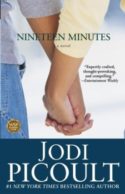



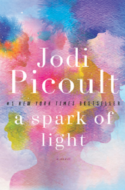
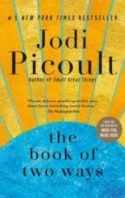

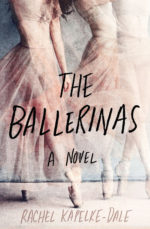

Comments are closed.